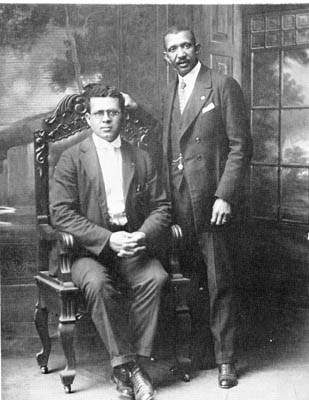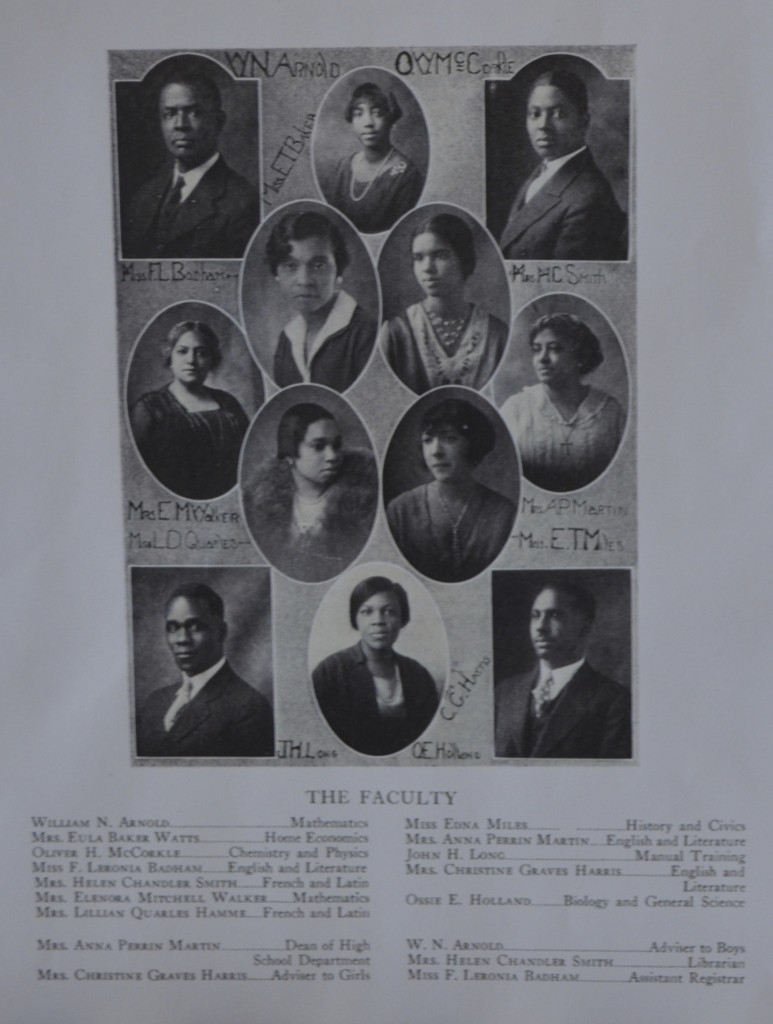Black History Month Spotlight – Elenora Mitchell Walker
Elenora Mitchell was one of six children born to William and Altona (Anderson) Mitchell of Raleigh, North Carolina. She and two of her sisters each had a part in Asheville’s history. Elenora and her sister Annabelle both earned college degrees at Shaw University. Elenora then taught mathematics in Raleigh public schools until 1904 when she married John Wakefield Walker. John Walker was the son of Amanda Walker, and the brother of Emmaline and Hester Walker. (Hester was the wife of Walter S. Lee, and Stephens-Lee Highschool was named in part after her.)

Heritage of Black Highlanders Collection
UNCAsheville Ramsey Library
(l – r) William Trent, John Wakefield Walker
Dr. J. W. Walker was a best friend and classmate of William J. Trent at Livingstone College. William was the first president of YMI, and just a few months before his friend James wed Elenora, William married Elenora’s sister, Annabelle. Annabelle came to Asheville from Raleigh to teach in Catholic Hill Elementary School and also taught piano lessons at home. William Trent was known for his tenor voice, and J.W. Walker was known for his deep voice and also sung bass. They were both members of the Livingstone College choir. I imagine the Walker and Trent homes were often full of music. Both of these men and their friends and associates were strong race men, founders of the YMI, and early leaders in Asheville’s African American community.
Dr. Walker became a specialist in the treatment of tuberculosis, eventually opening a sanitarium and later becoming head of the tuberculosis sanatarium for black people at the North Carolina State Sanitarium. He returned to Asheville after three years and remained in private practice here until his death.
Elenora taught mathematics at Stephens-Lee High school, and also taught piano in her home. She was remembered by Mrs. Lucy Mae Harrison who was one of her students as a child. Dr and Mrs. Walker were the parents of three children, John, Amanda Lee, and Annabelle. Elenora also was a mother to her niece Altona Trent after the untimely death of her sister, Annabelle Mitchell Trent at age 25. Unfortunately Elenora’s life was again marked by sadness as she lost her youngest daughter Annabelle at age 4 after a hernia operation. Later, her husband Dr. Walker took his own life in 1932 at age 57. Mrs. Walker was still in teaching in Asheville in the 1940 census. After Mrs. Walker’s retirement, she moved to New Jersey with her daughter Amanda.
Elenora’s sister Altona Maywood Mitchell attended Miner Teachers College, then worked as a kindergarten teacher in Washington, DC. She married George Richards, who owned a grocery store and also cut hair in a hotel in Asheville. Their children were Miriam and Frank, and they lived in a home at 101 Hill Street that later became the Hill Street School. Frank Richards graduated from Stephens-Lee High School, and left Asheville shortly after when both his parents had passed away. He went on to become a surgeon, who worked in the struggle to bring about racial equality in St. Louis Hospitals. His son, Dr. Frank O. Richards Jr. is an expert in parasitic and tropical diseases, and he is Director of the River Blindness Elimination Program among other programs at the Carter Center.
Women’s stories are often untold in the history books. Even in some obituaries, which might be the only time in a woman’s life where her name will appear in print, I might see the woman listed as Mrs. James Smith, completely erasing her separate identity, and often even in this space rather than telling about her life, the writer lists accomplishments of her husband. In this post, I have not only focused the lives of these three sisters but also that of their husbands and sometimes their children. Years ago and sometimes today, a woman was often measured by her status as a wife and mother, and judged by the failure of her marriage or her children. These sisters were women who pursued and earned college degrees when that was a rarity for black women. They worked in education, touching lives in ways that often go unmarked, although we know how good teachers can shape young people in innumerable positive ways. They married accomplished, hard working men, and together they provided their children with opportunities.
Please consider talking to the elder women in your family, and learn about their lives, dreams and accomplishments. Write their stories down and honor their work and sacrifice, and the love they poured into their children and grandchildren in hopes of a better future.

